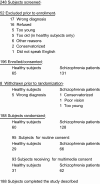Multimedia consent for research in people with schizophrenia and normal subjects: a randomized controlled trial
- PMID: 18245061
- PMCID: PMC2696362
- DOI: 10.1093/schbul/sbm148
Multimedia consent for research in people with schizophrenia and normal subjects: a randomized controlled trial
Abstract
Limitations of printed, text-based, consent forms have long been documented and may be particularly problematic for persons at risk for impaired decision-making capacity, such as those with schizophrenia. We conducted a randomized controlled comparison of the effectiveness of a multimedia vs routine consent procedure (augmented with a 10-minute control video presentation) as a means of enhancing comprehension among 128 middle-aged and older persons with schizophrenia and 60 healthy comparison subjects. The primary outcome measure was manifest decisional capacity (understanding, appreciation, reasoning, and expression of choice) for participation in a (hypothetical) clinical drug trial, as measured with the MacArthur Competence Assessment Tool for Clinical Research (MacCAT-CR) and the University of California San Diego (UCSD) Brief Assessment for Capacity to Consent (UBACC). The MacCAT-CR and UBACC were administered by research assistants kept blind to consent condition. Additional assessments included standardized measures of psychopathology and cognitive functioning. Relative to patients in the routine consent condition, schizophrenia patients receiving multimedia consent had significantly better scores on the UBACC and on the MacCAT-CR understanding and expression of choice subscales and were significantly more likely to be categorized as being capable to consent than those in the routine consent condition (as categorized with several previously established criteria). Among the healthy subjects, there were few significant effects of consent condition. These findings suggest that multimedia consent procedures may be a valuable consent aid that should be considered for use when enrolling participants at risk for impaired decisional capacity, particularly for complex and/or high-risk research protocols.
References
-
- Carpenter WT, Vasi H. NBAC process and recommendations: a critique from clinician investigators. Biolaw. 1999;2:S412–S416.
-
- Fins JJ, Miller FG. Enrolling decisionally incapacitated subjects in neuropsychiatric research. CNS Spectr. 2000;5:32–42. - PubMed
-
- Roberts LW. Evidence-based ethics and informed consent in mental illness research. Arch Gen Psychiatry. 2000;57:540–542. - PubMed
-
- Shore D, Hyman SE. An NIMH commentary on the NBAC report. Biol Psychiatry. 1999;46:1013–1016. - PubMed
Publication types
MeSH terms
Grants and funding
LinkOut - more resources
Full Text Sources
Medical


